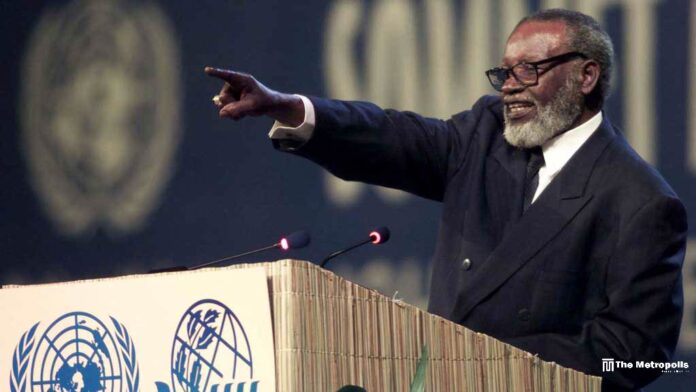Sam Nujoma, the activist and guerrilla leader who became Namibia’s first democratically elected president after the country gained independence from apartheid South Africa, passed away at the age of 95 on Saturday, according to the Namibian Presidency on Sunday.
Nujoma took office as the leader of the sparsely populated southern African nation on March 21, 1990, and was formally recognized as the “Founding Father of the Namibian Nation” through a 2005 parliamentary act.
While celebrated for his role in Namibia’s independence, his presidency was also marked by criticism, both domestically and internationally, for his intolerance toward critical media, his stance on homosexuality, and his push for a 1998 constitutional amendment that allowed him to run for a third term.
A longtime ally of Zimbabwe’s Robert Mugabe, Nujoma supported Mugabe’s controversial land seizures from white farmers, but in Namibia, he adhered to a “willing buyer, willing seller” policy.
“The foundations of the Republic of Namibia have been shaken,” the presidency posted on X.
“Our venerable leader, Dr. Nujoma, not only paved the way to freedom but also inspired us to rise and become the masters of this vast land of our ancestors.”
The presidency noted that Nujoma had been hospitalized for medical treatment over the past three weeks, but unfortunately, he could not recover from his illness.
COMPLEX LEGACY
Nujoma served three terms as president from 1990 to 2005, positioning himself as a unifying leader who sought to bridge political divides.
In a nation scarred by the legacies of apartheid and German colonialism, Nujoma’s SWAPO party implemented a national reconciliation program under the slogan “One Namibia, One Nation.”
He often repeated the phrase in his speeches: “A united people, striving to achieve a common good for all members of society, will always emerge victorious.”
His accomplishments included the establishment of democratic institutions and a focus on reconciliation, according to Ndumba Kamwanyah, a University of Namibia lecturer and political analyst.
However, his autocratic tendencies, including his treatment of the media and the brutal suppression of the 1999 Caprivi rebellion, cast a shadow over his legacy, Kamwanyah noted.
“While Nujoma’s presidency was fundamental in establishing Namibia’s independence and governance, it was not without its flaws,” Kamwanyah added.
CAMPAIGNER AND GUERRILLA
Born in 1929 in a village in northwestern Namibia, when the country was under South African administration, Nujoma grew up tending his family’s cattle and attending a Finnish mission school. He later moved to Walvis Bay and then Windhoek, where he worked for South African Railways, as described on his charitable foundation’s biography.
Nujoma eventually left his job to focus on dismantling the apartheid system.
In the late 1950s, he became the leader of the Owambo People’s Organisation, which later evolved into the SWAPO liberation movement, organizing resistance to the forced relocation of Black people in Windhoek. This resistance culminated in a tragic incident where the police killed 12 unarmed people and injured dozens more.
Charged with organizing the resistance, Nujoma was arrested. In 1960, he went into exile, traveling across Africa and later to the United States, where he advocated for Namibia’s independence at the United Nations.
Nujoma became the leader of SWAPO in absentia and established its armed wing, launching a guerrilla war against the apartheid government in 1966.
It took more than a decade of pressure from Nujoma and others before the UN Security Council proposed a ceasefire in 1978, and another decade before the ceasefire agreement was signed and elections held in late 1989.
SWAPO won a majority in those elections, and Nujoma assumed office in March 1990.



